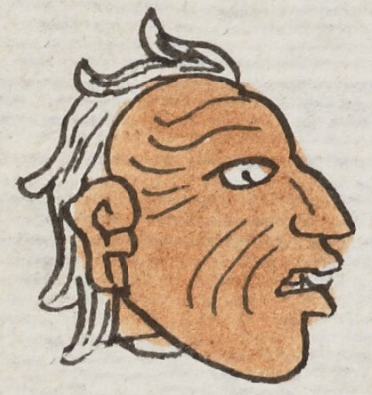xolochtic (Mdz38r)
This sign represents the adjective xolochtic (wrinkled). It is part of the simplex glyph of the place name Xolochiuhyan. It features a male elder in profile, looking to the viewer's right. We see his upper torso and head, outlined with black line drawings. His face and ear are painted with a tan/brown/terracotta flesh tone. His face has many wrinkles on the cheek, near the eye, and on the forehead and nose. His hair is white and wispy. His mouth is open slightly, showing teeth, but from this side view it is difficult to tell if any teeth are missing.
Stephanie Wood
The glyphs for the deity-ancestor-ruler Xolotl also show a wrinkled face. In Chimalpahin, the ancestor-ruler Xolotl was said to have lived to the grand age of 200 and to have ruled 112 years, as is mentioned in the Nahuatl Dictionary (quoting the work of Susan Schroeder). This provides the crossover with the concept of the old man. There are two Xolotl glyphs in the Codex Mendoza (below, right). See also our sign for huehue from folio 42 recto, which is the head of an old man much like this person.
Stephanie Wood
c. 1541, or by 1553 at the latest
Stephanie Wood
David Elliott
old men, aging, wrinkled, arrugado, viejos, envejecimiento, xiuhpohualli, año, turquesa, xihuitl

xoloch(tic), someone or something wrinkled, https://nahuatl.wired-humanities.org/content/xolochtic
-tic, a suffix for adjective-like substantives, https://nahuatl.wired-humanities.org/content/tic-0
arrugado
Stephanie Wood
Codex Mendoza folio 38 recto, https://digital.bodleian.ox.ac.uk/objects/2fea788e-2aa2-4f08-b6d9-648c00..., image 86 of 188.
The Bodleian Libraries, University of Oxford, hold the original manuscript, the MS. Arch. Selden. A. 1. This image is published here under the UK Creative Commons, “Attribution-NonCommercial-ShareAlike 3.0 License” (CC-BY-NC-SA 3.0).





